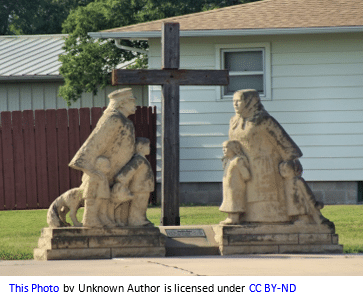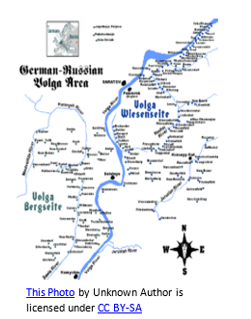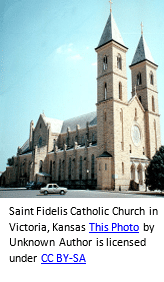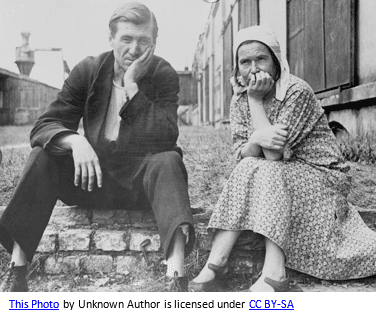Volga German Genealogy
 12
12Jun
 Perhaps you have heard of the term Volga Germans. Since many first settled in the Midwest and then spread to other states, many Americans can trace their ancestry to these immigrants called Volga Germans. So, who is this unique group of people and how do we get started on our Volga German genealogy work?
Perhaps you have heard of the term Volga Germans. Since many first settled in the Midwest and then spread to other states, many Americans can trace their ancestry to these immigrants called Volga Germans. So, who is this unique group of people and how do we get started on our Volga German genealogy work?
Volga German Genealogy
HISTORY OF THE VOLGA GERMANS
A thorough and excellent description is provided on the website called The Center for Volga German Studies which has been hosted by Concordia University of Portland, Oregon. Unfortunately, a recent post was seen on this website indicating Concordia  University will be closing and The Center for Volga German Studies must find a new home. However, the website appears to still be active and the following information was gathered. From their website we learn that on 4 December 1762, Catherine the Great, Empress of Russia, issued a Manifesto regarding colonization in Russia. On 22 July 1763, she issued a second Manifesto at the end of the Seven Years’ War. “This Manifesto was perfectly timed to appeal to the war and tax weary European populace. Copies were printed in newspapers and leaflets that were distributed throughout Europe, but with a focus in the German speaking lands where much of the war had been fought.” This second Manifesto was prepared in such a way to be attractive with promises of exemption from military service, freedom of religion, a 30-year exemption from taxes, and land provided at no cost with travel expenses paid by the Russian government.[1] Because of this latest Manifesto with its marvelous promises, many Germans came to settle the land provided by the Russian government along the Volga River. Between 1763 to 1772, 106 colonies were established. Other ethnic groups were attracted to this area, as well, but “over time, these minority groups assimilated into the dominant German culture of the colonies and all became known collectively as Wolgadeutsche (Volga Germans).” [2]
University will be closing and The Center for Volga German Studies must find a new home. However, the website appears to still be active and the following information was gathered. From their website we learn that on 4 December 1762, Catherine the Great, Empress of Russia, issued a Manifesto regarding colonization in Russia. On 22 July 1763, she issued a second Manifesto at the end of the Seven Years’ War. “This Manifesto was perfectly timed to appeal to the war and tax weary European populace. Copies were printed in newspapers and leaflets that were distributed throughout Europe, but with a focus in the German speaking lands where much of the war had been fought.” This second Manifesto was prepared in such a way to be attractive with promises of exemption from military service, freedom of religion, a 30-year exemption from taxes, and land provided at no cost with travel expenses paid by the Russian government.[1] Because of this latest Manifesto with its marvelous promises, many Germans came to settle the land provided by the Russian government along the Volga River. Between 1763 to 1772, 106 colonies were established. Other ethnic groups were attracted to this area, as well, but “over time, these minority groups assimilated into the dominant German culture of the colonies and all became known collectively as Wolgadeutsche (Volga Germans).” [2]
 A century after the first Germans had settled in the Volga region, Russia passed legislation that revoked many of the privileges promised to them by Catherine the Great. One of these was the promise of non-military service. Many of the Germans were required to serve in the military and many fought and died in Russian wars. About the time the Russian government was reducing privileges, several nations in the Americas attempted to attract settlers by offering land and making other promises. Volga Germans began arriving in the United States around the 1870s. They began settling in the Midwest, particularly in and around Kansas and then spreading to other states in the west. They arrived in Canada in the 1890s and settled in three provinces: Alberta, Manitoba, and Saskatchewan. They also were enticed to South America and settled mainly in Argentina and Brazil. [3]
A century after the first Germans had settled in the Volga region, Russia passed legislation that revoked many of the privileges promised to them by Catherine the Great. One of these was the promise of non-military service. Many of the Germans were required to serve in the military and many fought and died in Russian wars. About the time the Russian government was reducing privileges, several nations in the Americas attempted to attract settlers by offering land and making other promises. Volga Germans began arriving in the United States around the 1870s. They began settling in the Midwest, particularly in and around Kansas and then spreading to other states in the west. They arrived in Canada in the 1890s and settled in three provinces: Alberta, Manitoba, and Saskatchewan. They also were enticed to South America and settled mainly in Argentina and Brazil. [3]
FINDING THE VILLAGE OF ORIGIN
The immigrants to the United States preferred to maintain their culture, thus some passed on the knowledge of their place of origin in the Volga colonies. However, for those who do not have the fortune of knowing the village of origin, research needs to occur to learn this vital information. An excellent article regarding how to find the Volga German village of origin was prepared by Maggie Hein. It is titled, “Volga German Genealogy Research: Documenting Your Ancestors Lives in America and Canada"
To summarize her thoughts, basic steps follow:
- Interview family members who may have been more closely associated with the immigrant ancestors.
- Collect all possible documents from events which occurred in the United States.
- Birth, marriage and death records
- Church records
- Naturalization records
- Alien registration records –required by those immigrants whose homeland of origin was enemy territory during World War I and World War II. Click on the following for further information on how to access these files: Alien Registration Files World War 1 and Alien Registration Files World War II
- Ship passenger lists
- Social Security Applications – many are indexed on Ancestry.com
- Military Draft Registrations –sometimes these records name a precise place of birth rather than just a country.
- Search for obituaries on every member of the immigrant family whether they were born in Russia or not. One of the obituaries may mention the place of origin of the family.
- The AHSGR (American Historical Society of Germans from Russia) has an obituary collection available on FamilySearch.
 The AHSGR website has an Ancestor list of names. This is a list compiled from gedcoms of pedigrees and families submitted to the AHSGR by various descendants of Volga Germans. It is useful because it may list a known or previously unknown relative and often includes the village of origin. The Volga German Institute held at the University of Florida also has a surname list of residents of the Volga German colonies. Both databases are worth reviewing for ancestral surnames.
The AHSGR website has an Ancestor list of names. This is a list compiled from gedcoms of pedigrees and families submitted to the AHSGR by various descendants of Volga Germans. It is useful because it may list a known or previously unknown relative and often includes the village of origin. The Volga German Institute held at the University of Florida also has a surname list of residents of the Volga German colonies. Both databases are worth reviewing for ancestral surnames.
RECORDS FOR THE VILLAGE OF ORIGIN
Because of the interest of descendants of the Volga Germans, many records from the Volga region have already been gathered, digitized, and translated. In addition, many have hired genealogists to put together a pedigree and history of their ancestors which is in book form. However, there are still some birth, marriage and death records which will need to be accessed through the local archives which has a wealth of church records. Generally, a local researcher is needed to access these records.
One of the most useful records is the census, or what is termed the subsequent revisions of the census. These revisions include the years 1767 (often called the “First Settlers List), 1775, 1798, 1811, 1816, 1834, 1850 and 1857. Translated versions can be found for sale at Volga German websites.
In addition, some villages have had church records extracted from the archives which may also be for sale.
If you are lucky, someone has done research on your ancestral surname and there is a book published and ready for purchase. Some short biographies are also on some of the Volga German websites.
When determining what records are available for your ancestral village and where they are for sale, you will want to become familiar with the following websites.
- American Historical Society of Germans From Russia
- Germans from Russia at volgagerman.net
- Concordia University: The Center for Volga German Studies Even though the host for this website is moving, the website appears to still be available.
- Volga German Institute at University of North Florida.
These websites contain maps as well as a wealth of information and resources of which only the “tip of the iceberg” has been mentioned in this blog.
ORIGIN IN GERMANY
Eventually, after research brings you to the immigrant ancestor in the Volga colonies, you will want to learn where they came from in Germany. One resource is a book(s) titled “Einwanderung in das Wolgagebiet, 1764-1767” by Igor Pleve. Included in Volume I is a detailed list of the first settlers often providing their ages, occupations, families and place of origin in Germany. Volume II also has lists of original settlers compiled in 1767-1768 for several more villages. These books are available at the Family History Library in Salt Lake City, but are not digitized at this time. Volume 1 is for sale at the AHSGR website.
Another good source to check is the biography section on both the Center for Volga German Studies and the Volga German Institute. Even if your ancestor isn’t listed, you might look for one with the same surname and perhaps it will provide a clue to helping you locate the German village of origin.
Doing Volga German genealogy work can truly be a wonderful adventure. They brought much of their culture to America with German-style churches, distinctive cemeteries, food, family and language as well as their hardy strength of character. There are many records to be searched and people ready to answer questions. If you need help in this adventure, Price Genealogy has experts ready to assist.
Diane
[1] Concordia University, Portland, Oregon, “The Center for Volga German Studies” (https://cvgs.cu-portland.edu/who-are-volga-germans/history/manifesto)
[2] Concordia University, Portland, Oregon, “The Center for Volga German Studies” (https://cvgs.cu-portland.edu/who-are-volga-germans).
[3] Concordia University, Portland, Oregon, “The Center for Volga German Studies,” Immigration https://cvgs.cu-portland.edu/who-are-volga-germans/history/immigration
Do you have any other questions about Volga German genealogy? Let us know in a comment below!
